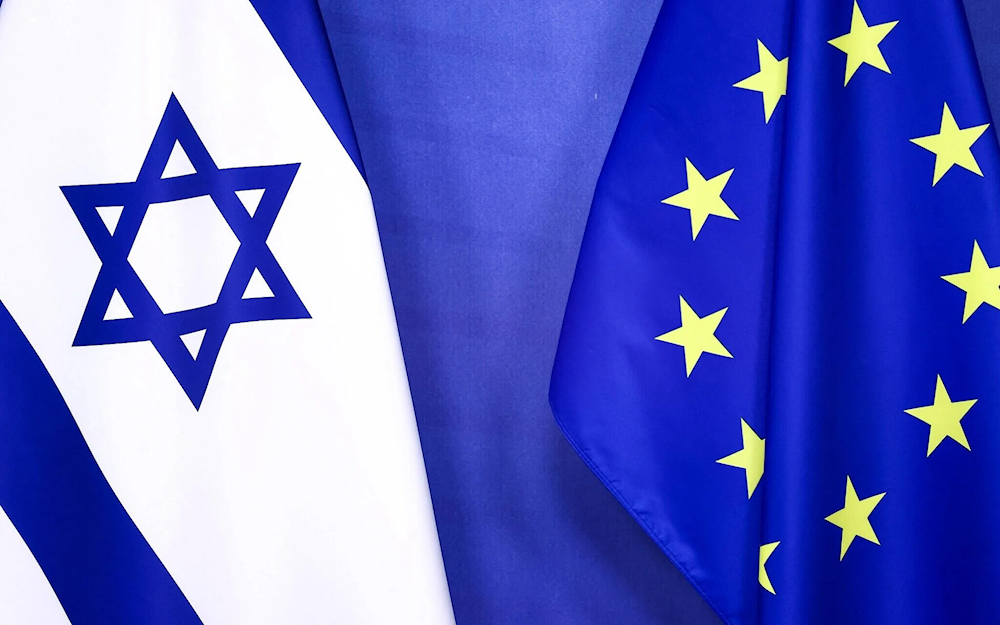WP: Europe shifts views on 'Israel' as Gaza war intensifies criticism
As Gaza’s humanitarian crisis deepens, European leaders, including Macron, Starmer, and Merz, criticize "Israel’s" actions, sparking calls for sanctions and a revived two-state solution.
-

The Israeli occupation flag and the European Union flag are seen at EU headquarters in Brussels, on January 25, 2023 (Kenzo Tribouillard/AFP)
In an excerpt from the WorldView newsletter for the Washington Post, Ishaan Tharoor argues that Europe’s political stance toward "Israel's" "war on Gaza" is undergoing a visible shift, with European leaders taking a more critical stance on "Israel".
As public outrage over "Israel’s" military campaign, mounting Palestinian casualties, and the deepening humanitarian crisis continues, calls for accountability by traditionally allied European states have become prevalent.
This shift in Europe's stance on "Israel" shows a rare break in decades of EU diplomatic alignment with Tel Aviv, as shown by French President Emmanuel Macron, who recently opened a major speech in Singapore by warning that the West's credibility on Ukraine is being undermined by its perceived double standards on Gaza.
According to Tharoor, while reaffirming condemnation of Hamas’ October 7 Al-Aqsa Flood, Macron cautioned that the failure to hold "Israel" accountable risks damaging the legitimacy of European foreign policy, stating that, “if we abandon Gaza... we kill our own credibility in the rest of the world.”
France, which has traditionally backed a two-state framework, is moving to co-chair a conference with Saudi Arabia on Gaza’s future later this month. Macron is reportedly considering recognition of a Palestinian state, a diplomatic shift that would align France with other European governments already pursuing symbolic recognitions, according to the newsletter.
Macron's efforts signal a possible revival of the two-state solution framework, which has largely been abandoned by the US and Israeli leadership in recent years.
European leaders intensify criticism of Israeli military actions
In the UK, Prime Minister Keir Starmer has called "Israel’s" actions in Gaza “appalling, counterproductive and intolerable.” While resisting full suspension of arms sales to "Israel", he told parliament the government is weighing targeted sanctions on individual "Israeli" officials.
Tharoor shows that the UK is facing dissent over it's unwavering backing of "Israel" through arms sales in both major parties. Conservative Member of Parliament, Kit Malthouse, declared that Gaza had become “an abattoir” and suggested that, in reverse circumstances, Britain would be deploying troops for humanitarian intervention.
Germany, long seen as "Israel’s" most steadfast ally in Europe, is also rethinking its tone. Chancellor Friedrich Merz recently asked whether the Israeli military still has a clear goal in Gaza, calling the war “a political catastrophe.”
A similar criticism was given by Foreign Minister Johann Wadephul, who when speaking alongside his Israeli counterpart in Berlin, openly condemned new illegal Israeli West Bank settlements, stating, “we cannot ignore that as friends,” and, “this settlement policy is contrary to international law and creates obstacles to a two-state solution.”
EU considers sanctions as Gaza humanitarian crisis worsens
The EU response to the humanitarian crisis taking place in the Gaza Strip has taken on new urgency following recent incidents in which dozens of starving Palestinians were killed by Israeli gunfire near aid sites linked to the US- and Israeli-backed Gaza Humanitarian Foundation.
The Washington Post newsletter shows that Sweden’s Foreign Minister Maria Malmer Stenergard has called for sanctions against "Israel" to be imposed by the EU, specifically targeting ministers who promote illegal settlements and oppose peace talks.
Meanwhile, the EU is reviewing trade ties with "Israel", though a full suspension remains unlikely due to internal divisions. Some member states, like Hungary, continue to back "Israel" staunchly, while others, including Ireland and Spain, have supported Palestinian statehood.
“The Europeans don’t have much leverage and what they do have they still seem unwilling to use,” said Jeremy Shapiro of the European Council on Foreign Relations, according to Tharoor.
Analysts warn Europe’s stance may still lack real leverage
Even as public opinion turns sharply against "Israel" across the continent, analysts caution that most of the EU’s current response remains performative. Concrete pressure on the ground remains limited, and much depends on the political will of major powers like France, Germany, and the UK to follow through.
According to Tharoor, Europe's shifting stance on "Israel's" brutal assault on the Gaza strip may mark the beginning of a deeper realignment in European foreign policy, one shaped as much by public backlash as by geopolitical calculus.

 4 Min Read
4 Min Read










